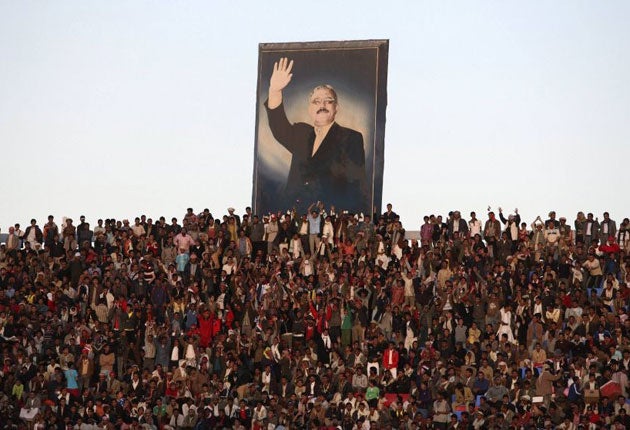Defiant Yemen tells US soldiers to keep out
Donald Macintyre reports from Sana'a on the country's refusal to become the latest hub of America's war on terror

Your support helps us to tell the story
From reproductive rights to climate change to Big Tech, The Independent is on the ground when the story is developing. Whether it's investigating the financials of Elon Musk's pro-Trump PAC or producing our latest documentary, 'The A Word', which shines a light on the American women fighting for reproductive rights, we know how important it is to parse out the facts from the messaging.
At such a critical moment in US history, we need reporters on the ground. Your donation allows us to keep sending journalists to speak to both sides of the story.
The Independent is trusted by Americans across the entire political spectrum. And unlike many other quality news outlets, we choose not to lock Americans out of our reporting and analysis with paywalls. We believe quality journalism should be available to everyone, paid for by those who can afford it.
Your support makes all the difference.Yemen insisted yesterday that it could handle its own mounting security challenges without any direct foreign intervention, pointedly warning Washington to learn the lessons from Iraq and Afghanistan.
While welcoming US intelligence and technological co-operation, the Deputy Prime Minister for Defence and Security, Rashad al-Alimi, told a crowded news conference in the capital, Sana'a, that the government did not want foreign troops on its soil.
That message was reinforced by Foreign Minister Abukar al-Qirbi, who told CNN that fighting militants was "the priority and the responsibility of our security forces and the army".
On the possibility of direct US military intervention, he said: "No, I don't think we will accept that. I think the US as well have learned from Afghanistan and Iraq and other places that direct intervention can be self-defeating."
Yemen has found itself the focus of sharply increased international concern after responsibility for Umar Farouk Abdulmutallab's failed Christmas Day bombing was claimed by al-Qa'ida's resurgent Arabian Peninsula wing, which is now based in Yemen, the poorest country in the Arab world.
But at yesterday's press conference, Mr al-Alimi was keen to stress that the Nigerian student had been recruited by al-Qa'ida while he was in Britain. Abdulmutallab is known to have studied engineering at University College London before a second visit to Yemen in 2009. "The information provided to us is that Umar Farouk joined al-Qa'ida in London," the Yemeni minister said.
The Home Office made no immediate response to the allegation. It referred reporters to Wednesday's statement by Home Secretary Alan Johnson to the House of Commons that the Nigerian had been radicalised after leaving Britain.
The Yemeni authorities conceded that Abdulmutallab appeared to have met a radical American Muslim cleric in Yemen. The preacher, Anwar al-Awlaki, reportedly exchanged emails with Major Nidal Malik Hasan, a US Army psychiatrist charged with killing 13 people at Fort Hood, Texas, and in October last year he predicted that Yemen could produce "the next surprise of the season".
Despite original Yemeni claims that Al-Awlaki was killed in a strike on an al-Qa'ida meeting place on 27 December, there has been widespread doubt over whether he and two other top leaders of the Yemen wing were hit, with some reports saying he escaped and is on the run.
Yemeni security forces have since launched operations to root out militants they said were behind threats that forced Western embassies to close on Sunday. The US embassy has subsequently reopened after the raid, which killed two militants.
Yemeni officials are also sensitive about claims that they had previously subordinated operations to clamp down on al-Qa'ida to its continuing conflict with Shia rebels in the north and efforts to tackle a growing secessionist threat from the formerly communist-run south. There have also been persistent criticisms that the country's stability has been further undermined by government corruption and the struggle by its long-standing President, Ali Abdullah Saleh, to maintain rule by himself and his family.
Accusing al-Qa'ida of trying to make inroads into the Houthis (rebels) and southern secessionists, the Foreign Minister partly acknowledged the first of those charges, saying: "I think our thought was that maybe we should spare al-Qa'ida in the last year because of the confrontation in the south and with the Houthis. But al-Qa'ida took advantage of that."
Yemen now says that it has stepped up its pursuit of al-Qa'ida in the capital and two neighbouring provinces of Shabwa and Maarib, with security sources claiming the capture of eight militants in recent days. Checkpoints have reportedly been increased on major roads. A car journey through poorly lit streets to the centre of the capital in the early hours of yesterday passed three mobile checkpoints manned by armed security forces, while a fourth was visible on a dual carriageway leading to one of the city's barricaded main hotels.
Meanwhile Reuters reported that gunmen shot dead two Yemeni soldiers in an attack on a police station in Aden, the former capital of South Yemen. An independent Yemeni news website quoted a security official saying that the gunmen were believed to be suspects wanted in criminal cases.
Join our commenting forum
Join thought-provoking conversations, follow other Independent readers and see their replies
Comments